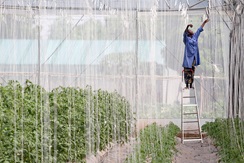Climate change and the environment
To ensure that gender equality and women’s empowerment are reflected in global efforts to secure a more sustainable planet, UN Women works for women’s active participation and the inclusion of gender-specific mandates across negotiated outcomes and agreements. To support advocacy, UN Women prepares technical papers backed by research, communicates key gender equality linkages through high-level events and outreach, and supports the engagements and work of gender equality advocates.
United Nations Framework Convention on Climate Change
The United Nations Framework Convention on Climate Change (UNFCCC) was adopted at the Rio Earth Summit in 1992, with the ultimate aim to prevent dangerous human interference with the climate system. The 1997 Kyoto Protocol and 2015 Paris Agreement build on the Convention.
The Paris Agreement was a considerable achievement for the international community. For the first time, a climate change agreement brought all countries into an ambitious undertaking to combat climate change by limiting global temperature rise to well below 2 degrees Celsius, and to strive for 1.5 degrees Celsius. The Paris Agreement complements the Sustainable Development Goals as it encourages all countries to develop a “roadmap” for climate actions through the nationally determined contributions that seek not only to reduce emissions, but also to build sustainable development pathways.
Every year, Parties to the Convention meet. In its 2017 meeting, Parties will meet to advance the aims and ambitions of the Paris Agreement and achieve progress on its implementation guidelines.
Conference of the Parties (COP) 23
At COP 23, the forty-seventh session of the Subsidiary Body for Implementation (SBI 47), will also meet and consider possible elements of the gender action plan as mandated by a decision from COP 22. UN Women engages closely with Parties and observers to contribute to the development of the gender action plan.
Specifically, UN Women submitted possible elements of the gender action plan and supported Parties in organizing a two-day informal consultation with a large group of Parties and interested observers in The Hague in March 2017. The summary report of the informal consultation was submitted as input to the in-session workshop during SBI 46 in May 2017 and served as the basis for discussions. Read more»
COP 22
With the entry into force of the Paris Agreement, the twenty-second session of the Conference of the Parties to the UN Framework Convention on Climate Change (COP 22) is momentous. The Conference of the Parties serving as the meeting of the Parties to the Paris Agreement (CMA 1) will meet for the first time.
For UN Women, the Paris Agreement is historic and an important milestone. It is the first universal climate change agreement to call on Parties to promote gender equality and the empowerment of women when taking actions to address climate change. The Paris Agreement also calls on Parties to implement gender-responsive adaptation and capacity-building actions. These commitments from the Paris Agreement, together with the numerous earlier decisions that call for gender-specific action across the different areas of work of the Parties to the Convention, provide a strong foundation for truly gender-responsive climate actions and centrally embed women’s and girls’ needs, interests and contributions in this work. Read more»
COP 21
The twenty-first session of the Conference of the Parties (COP) took place from 30 November to 11 December 2015, in Paris, France. Parties from around the world gathered and adopted a legally binding and universal climate agreement. Among other things, it seeks to ensure that global temperature is kept below 2°C. UN Women has followed the negotiations closely and provided technical advice to ensure that the climate agreement incorporates language on gender equality and women’s empowerment. Read more»
Gender equality issues in the UNFCCC context
The Convention itself does not make specific reference to gender or women and girls. The first linkage to gender equality was made only in 2001, with decision 36/CP.7 on enhancing the participation of women at all levels of decision-making related to climate change. Attention to gender perspectives and recognition of the relevance of gender equality and women’s empowerment in climate change discussions have grown since the adoption of the Cancun Agreements at COP 16 (2010), which called for gender-sensitive adaptation actions, among others.
At COP 18, the inclusion of gender equality and climate as a standing agenda item by the COP in decision 23/CP.18 paved the way for the systematic consideration of gender equality by Parties to the Convention. The decision also adopted the goal of gender balance in the UNFCCC process and requested the UNFCCC secretariat to annually report information on the gender composition of constituted bodies and delegations.
At COP 20, Parties adopted the two-year Lima Work Programme on Gender to promote gender balance and achieve gender-responsive climate policy, including by supporting in-session workshops, training and capacity-building.
COP 21 was a turning point and an important milestone for the consideration of gender equality and women’s empowerment in climate action. The Paris Agreement enshrines a call for Parties to promote gender equality and the empowerment of women when taking actions to address climate change. The Paris Agreement also calls on Parties to implement gender-responsive adaptation and capacity-building actions. These commitments from the Paris Agreement, together with the numerous earlier decisions that call for gender-specific action across the different areas of work of the Parties to the Convention, provide a strong foundation for truly gender-responsive climate actions and centrally embed women’s and girls’ needs, interests and contributions in this work.
At COP 22, decision 21/CP.22 on ‘Gender and climate change’ extended and enhanced the Lima Work Programme of Gender for a period of three years and mandated the development of a gender action plan for the UNFCCC process. The decision also promotes the reporting by constituted bodies and Parties on progress made towards integrating a gender perspective in their processes and their climate policies, respectively.


